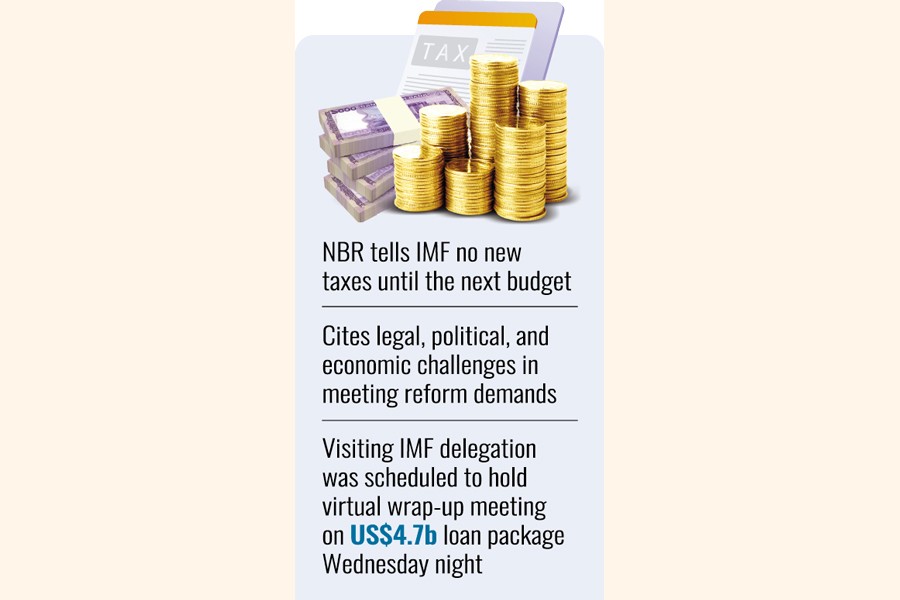
Published :
Updated :

The government has firmly told the International Monetary Fund (IMF) that it will not impose any new tax or raise the rate of existing ones before the next national budget that will be prepared under a new government.
Officials said the stance reflects both legal and political considerations as the interim administration seeks to maintain stability ahead of the polls.
If the election is delayed, the National Board of Revenue (NBR) may revisit the issue in the budget for fiscal year 2026-27, officials added.
The decision was conveyed during a recent meeting between the NBR and the visiting IMF review mission, which is in Dhaka to assess progress under Bangladesh's US$4.7 billion loan programme.
The mission also suggested scrapping all existing Statutory Regulatory Orders (SROs) that provide tax exemptions or reliefs.
The IMF delegation, which arrived in Dhaka on October 29, 2025, was scheduled to hold a virtual wrap-up meeting Wednesday night with the Finance Adviser, Finance Secretary, Economic Relations Division Secretary, and NBR Chairman.
The IMF has urged Bangladesh to raise its tax-to-GDP ratio by reducing exemptions, a proposal the NBR has declined to implement under the interim government.
The IMF's target was to lift the ratio to 7.8 per cent this fiscal year, though it slipped from 7.2 per cent to 6.6 per cent last year amid economic volatility, import declines, and political unrest.
Officials said the IMF's next loan tranche, expected in December, is now uncertain, giving the interim government room to delay or reject certain reform conditions.
NBR officials explained that many tax exemptions are subject to "sunset clauses" and cannot be withdrawn abruptly due to legal constraints.
They also told the IMF that previous mid-year tax hikes had triggered protests with little revenue gain amid last year's instability.
A senior NBR official said Chairman Abdur Rahman Khan reaffirmed a "no-tax-hike" policy in the absence of an elected parliament, consistent with the government's new Tax Expenditure Policy.
Responding to IMF recommendations for a uniform 15 per cent VAT rate on all goods and services, the NBR said it plans to move gradually toward harmonisation.
Exemptions will remain for basic food items, health, education, and agriculture.
The IMF also suggested doubling the minimum turnover tax from 1.0 per cent to 2.0 per cent, but the NBR said there is "no scope" to do so after the rate was quadrupled from 0.25 per cent in the last budget.
The IMF further proposed treating the turnover tax as adjustable or refundable, rather than as a final settlement.
On July 1, 2025, the government implemented the Tax Expenditure Policy and Management Framework (TEPMF), which restricts the NBR's authority to grant new tax exemptions without parliamentary approval, except during a national emergency.
Officials reiterated that tax exemptions governed by sunset clauses will remain valid until expiry, warning that any premature withdrawal could trigger legal complications and discourage investors who relied on those incentives.
doulotakter11@gmail.com


 For all latest news, follow The Financial Express Google News channel.
For all latest news, follow The Financial Express Google News channel.